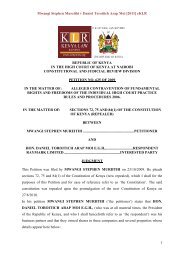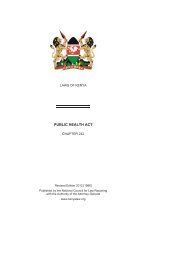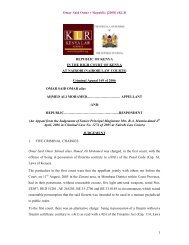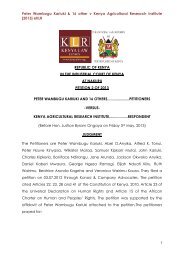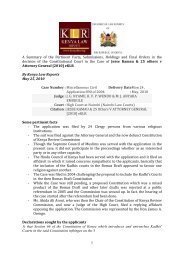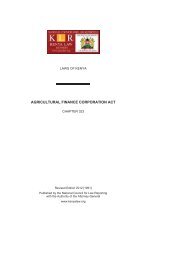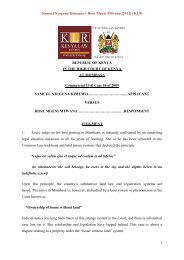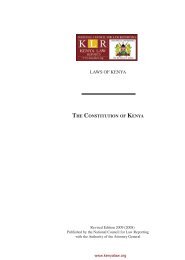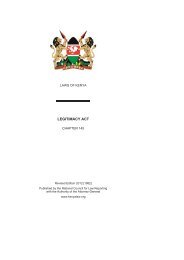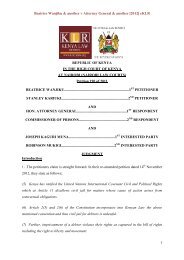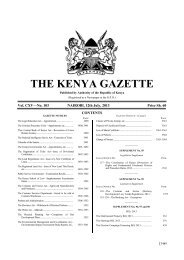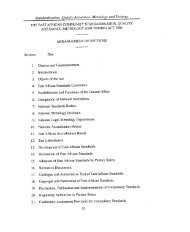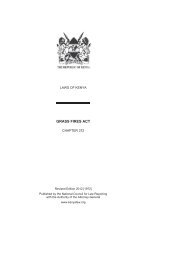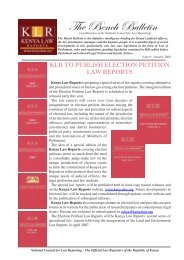Bench Bulletin - Issue 12 - Kenya Law Reports
Bench Bulletin - Issue 12 - Kenya Law Reports
Bench Bulletin - Issue 12 - Kenya Law Reports
You also want an ePaper? Increase the reach of your titles
YUMPU automatically turns print PDFs into web optimized ePapers that Google loves.
KENYA LAW REPORTS<br />
BENCH BULLETIN<br />
FROM THE COURTS — HIGH COURT<br />
tendered a conditional resignation under By-<strong>Law</strong> 28 but questioned the legality of the said by-<strong>Law</strong> by letter and also<br />
in the meeting. The issue of the legality of by-<strong>Law</strong> 28 was ignored on the ground that his resignation from the Council<br />
had been accepted though it was factually incorrect that he had offered to record his conditional resignation but it<br />
was rejected. The applicant raised an objection that if he was not elected, he should retain his Council position until<br />
2009. He argued that the by-laws were illegal and inconsistent with the Act. After deliberations, it was decided that<br />
the applicant had validly resigned from the Council and was a candidate for chairmanship.<br />
In opposing the Notice of Motion, the Chief Executive and Secretary of the ICPSK deponed that the application had<br />
been brought out of time. It was contended that under Section 37 of the Act, the Minister was empowered to make<br />
regulations prescribing anything required to be done under the Act.<br />
It was further argued that Section 7 of the Act empowered the Institute to perform certain functions and pursuant to<br />
that, the institute tabled and adopted its first by-laws on June 13, 1995 at an AGM which included provisions on election<br />
of Chairman and Council members. It was also contended that the applicant was not entitled to judicial review orders<br />
as he was approbating and reprobating. It was alleged that he been a beneficiary of the said regulations since he had<br />
served as a Council Member since their promulgation and only sought to challenge them after his loss.<br />
Held;<br />
1. Order 53 rule 2 of the Civil Procedure Rules did not include anything covered by the principle of ultra vires or<br />
nullities or decisions made without jurisdiction. A decision which was a nullity ‘ab initio’ was no decision at all and an<br />
order of certiorari could lie at any time. In the circumstances, the by-laws/regulations could not be said to be challenged<br />
outside the time allowed. It was however upon the applicant to demonstrate that they were nullities or made without<br />
jurisdiction. The court had jurisdiction to hear and determine the matter.<br />
2. Section 37 of the Certified Pubic Secretaries of <strong>Kenya</strong> Act mandated the Minister to make regulations prescribing<br />
anything or for purposes of giving effect to the Act. The Minister in charge had not promulgated any regulations under<br />
that section. Though the respondent purported to promulgate the impugned by-laws under Section 7 of the Act,<br />
nothing in that section stipulated provisions to suggest that the ICPSK had power to make the regulations. The power<br />
to promulgate the regulations was specifically donated to the Minister and if the intention of the legislature was to<br />
donate those powers to the respondent, that would have been specified.<br />
3. Under Section 27 of the Interpretation and General Provisions Act (Cap 2), subsidiary legislation had to be gazetted.<br />
There was no evidence that the impugned regulations were ever gazetted as required by law and it was not known when<br />
they came into force. ICPSK had no power to promulgate any regulations and whatever was held out as regulations<br />
had not been gazetted and had no force of law<br />
4. By-laws 27 to 38 were inconsistent and in conflict with section 9 and the second schedule of the Act. As they were<br />
a duplication of what was contained in the second schedule. The by-laws purported to provide for Council meetings<br />
and elections. There already were provisions relating to the Council in the Act and ICPSK’s promulgation of other<br />
regulations to apply in place of the Act and second schedule was ultra vires. The regulations in relation to the elections<br />
of the meeting were hence a nullity ab initio.<br />
5. The conduct of a party seeking judicial review orders was an important fact to consider. A party who approached the<br />
court for judicial review orders had to do so with clean hands and in utmost good faith. The applicant was approbating<br />
and reprobating and could not be entitled to judicial review orders. The doctrine of approbation and reprobation<br />
required for its foundation inconsistency of conduct, as where a man, having accepted a benefit given him by a judgment<br />
cannot allege the invalidity of the judgment which conferred the benefit.<br />
Application allowed in part; an order of certiorari issued to quash the impugned by-laws<br />
Advocates<br />
Mr. Kibe for Applicant<br />
Mr. Chacha for Respondent<br />
Common intention in a ‘mob justice’ case.<br />
Republic v Peterson Karani Njogu<br />
Criminal Case 40 of 2008<br />
M.S.A. Makhandia<br />
February 5 th 2010<br />
Court Station: Nyeri<br />
Reported by Monica Achode<br />
Criminal <strong>Law</strong> - common intent-several persons acting in concert to execute a common action - mob beating of a suspected<br />
criminal-“mob justice”-necessary ingredients in proving common intent and motive-court position where evidence<br />
<strong>Issue</strong> <strong>12</strong>: April-June 2010<br />
73



